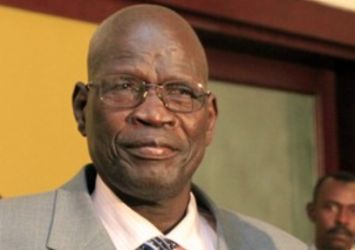South Sudan army vows readiness to pull back from buffer zone
November 7, 2012 (JUBA/KHARTOUM) – South Sudan’s army has pledged to withdraw its forces from the demilitarized buffer zone it has agreed to establish along its tense border with Sudan, following the first sitting of a joint security committee on Monday in the Southern capital, Juba.

John Kong Nyuon, South Sudan’s Defence Minister told the press on Tuesday that the armies of both countries were “ready” to remove their troops 10km either side of a temporary borderline proposed by the African Union to establish the demilitarised zone.
The South Sudanese army (SPLA) “are ready to pull back 10km south from their current positions in areas which have been identified as buffer zones so that they are demilitarized as required in the agreement. The Sudanese armed forces will do the same,” Nyuon said.
The joint committee, chaired by the South Sudanese minister and his Sudanese counterpart Abdel Rahim Hussein, will hold a series of meetings to discuss the implementation of security arrangements agreed in September during African Union-moderated talks in Addis Ababa.
The meeting, which was delayed several times, is focusing on the withdrawal of troops from the buffer zone, deployment of joint monitoring teams along the 1,800km border. From Khartoum point of view, this meeting will tackle also the presence of Sudanese rebels in the South Sudan and ways to prevent the cross border attacks.
Since Sunday reports from Khartoum say the South Sudanese side in the technical discussions aiming to prepare the joint security meetings refused to include the issue of the SPLM-N and its supposed presence in the South Sudan.
Sudanese officials under the cover of anonymity say Juba refuses any discussion about their relation with the SPLM-North which was part of the ruling party and current South Sudanese army before the independence. The close-door meetings attended by Chief mediator Thabo Mbeki failed to mark any progress on this respect.
However minister Nyuon said that they only refused to include Blue Nile and South Kordofan in the demilitarised zone without elaboration over the remaining issues that Khartoum raised about the presence or support to the Sudanese rebels.
During the talks, Pagan Amum South Sudanese chief negotiator said they handed the position of his government about Khartoum’s demand to disengage with the SPLM-North to the mediation.
Juba denies supporting the Sudanese rebel groups but admits sympathy with their plight and proposed to facilitate talks between the two sides.
The buffer zone, including the five disputed areas, will be 10km either side of a temporary and non-binding line fixed by the mediation to allow the deployment of joint border monitoring teams.
The inclusion of the Mile 14 area within the demilitarised zone has drawn strong criticism from many in Northern Bahr el Ghazal State, including the Governor and other senior officials.
Speaking on Tuesday, the South Sudanese Defence Minister pleaded for the public to support the agreement, arguing that it breaks down fears and security suspicions among border communities and promotes the direct flow of goods and services between the two countries.
Minister Nyuon said that the deal will allow resources and trade to flow across the world’s newest international border, to create development instead of war.
Khartoum’s decision to close the border was triggered by the outbreak of conflict north of the border in South Kordofan State, where fighters which fought with the SPLM/A – now South Sudan’s ruling party and army – during the civil war refused to disarm before the protocols for the area were fully implemented.
Sudan has accused the SPLM in South Sudan of continuing to back the SPLM-North after partition. Addressing the issue of rebel groups in each other’s territories was a key part of the security deal in September.
The SPLM-N, has welcomed the deal but claim has reaffirmed its claim that it controls 40% of of the north-south border, including parts of Blue Nile State.
The border closure has had a serious affect on the economies of South Sudanese border states which rely heavily on imports from Sudan.
“Our people need to work together with the government to support implementation of this agreement. The border communities should actually take the lead in supporting it because they are first beneficiaries of this agreement. It brings a lot of things. It comes with peace and removes fears and threats of war. It allows citizens from two countries to resume border trades and free movement of goods and people”, Nyuon told reporters on Tuesday.
Minister Nyuon downplayed the fears of border communities, whose members see demilitarization of the buffer zone as relinquishing their territorial claims over the border areas.
“This is a not border demarcation. It is an arrangement which the two sides agreed to establish a safe demilitarized zone, requiring the two armed forces to withdraw 10km each side from their current positions. They will leave border areas under joint monitoring forces with the participation of the international observers. The area will be free from armed activities”, he said.
Salva Mathok Gengdit, the Deputy Interior Minister told Sudan Tribune on Monday that South Sudan’s police force is ready to be deployed to the border areas where their presence is required.
(ST)
